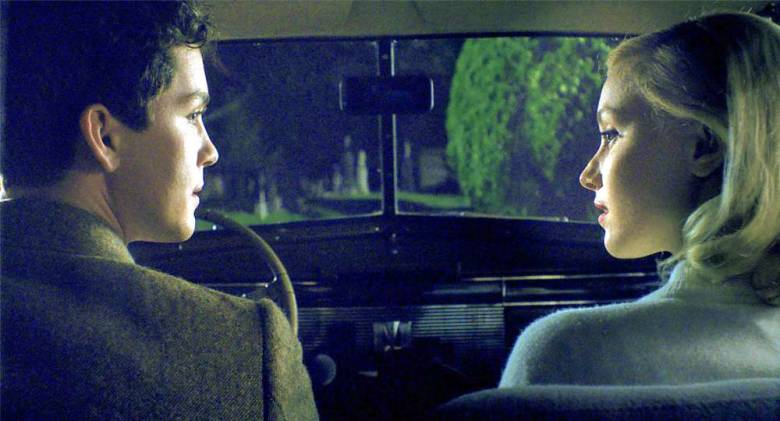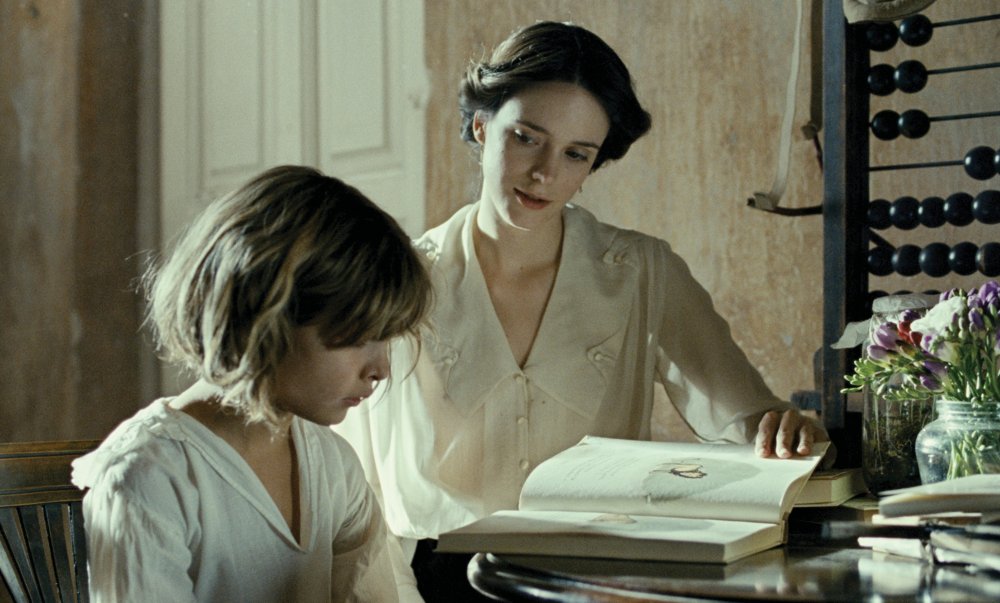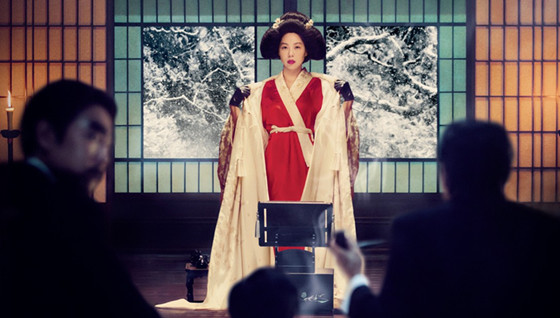5. Indignation (Jay Wadley)

“Indignation” is a deeply touching movie and the score fits it exceptional well. Jay Wadley’s musical work is dominated by beautiful harmonies marking the thin line between love and doubt. Marcus Messner, the son of a Jewish butcher, leaves his hometown in order to start his scholarship in Ohio to become a lawyer.
Being racked with the desperate desire of an identity separated from familiar, religious, and political boundaries, he is confronted with his inability to accept love after meeting the gorgeous but unstable student Olivia.
Wadley’s music perfectly captures the poignant pleasure of leaving home and gaining freedom just to see academic and churchy authorities permeating the protagonist’s life. It’s all about oscillating between melancholy and joy here, sometimes even blurring intransparent into each other, especially the protagonist’s non-affiliation to his environment and the inner conflict about his will and doubt regarding his love for Olivia.
Through this, it gets a flawless musical treatment. Aside from that, the audience gets irresistibly involved in the atmosphere of 1950’s America and the often elitist world of higher education, strongly influenced by the political extensions of the McCarthy era.
4. The Childhood Of A Leader (Scott Walker)

What begins like an unplugged version of the “Mad Max: Fury Road” score (and this is a huge compliment) is one of the most distinct soundtracks the world got to hear in cinema last year. In manner of “The White Ribbon” by Michael Haneke, the ambitious debut of Brady Corbet about the mental condition of an adolescent boy in 20th century France and the familiar power struggle poses the question: Where is the origin of evil?
As well as the movie, the musical work of Scott Walker pursues exactly that. Sonorous and meandering basses accompanied by ghostly pads and dark strings line the nightmarish visions of the child. Illustrated by the dark and triste cinematography of Lol Crawley, the music strikes the right note by sliding to subtle dissonances in order to underline the boy’s increasing disaffection and his rebellious actions.
Especially in the last quarter of the movie, with its plot-twisting ending setting the earlier events into a terrifying context, foreshadowing an era dominated by fascism and crimes against humanity, the music gives a distressing taste of the protagonist’s suppressed psychopathic anger.
At the latest, the allegorical functionality of Walker’s music shows oneself in this exceptional climax by evolving into an orchestral inferno after building from steady and slow-pacing soundscapes. However, critics will argue that, regarding to the length of the movie, the musical parts are very short and often intermittent by enduring stages of silence. But instead of giving a feeling of boredom, this simply pushes the score to its level of brilliance.
3. Nocturnal Animals (Abel Korzeniowski)

After his first collaboration with Tom Ford on “A Single Man” in 2009, which led to a well-deserved Golden Globe nomination, Polish composer Abel Korzeniowski delivers another excellent score for the disturbing psychological thriller “Nocturnal Animals”.
Distressed married gallery owner Susan Morrow (electrifying embodied by Amy Adams) receives an ominous manuscript written by her former husband Edward Sheffield. While reading, the story starts to merge into a two-layer thriller with the book offering nerve-racking metaphors for Susan’s past.
Despite the exceptional Lynch-influenced visualization (just think about the endless nocturnal highway as a motive), the score is an outstanding main feature of the movie. What’s so great about Korzeniowski’s work here is his ability for creating a distinct acoustic world.
For a movie which permanently changes between one world and another, this talent is worth one’s weight in gold. The exceptional theme brilliantly captures Susan’s inner conflict between her cold-hearted high gloss world and the dark human abysses the mysterious manuscript deals with.
It is difficult to name a highlight of this perfectly-balanced score simply because everything seems to be exactly the way it should be. But the slow-building monster of a scene on the lost highway, ending in the ruthless kidnapping of mother and daughter by some terrifying nobodies, is by far one of the greatest and most thrilling scenes the world got to see in 2016. Korzeniowski’s suspenseful score definitely has an explicit part in that.
2. The Handmaiden (Jo Yeong-wook)

There are plenty of great South Korean scores from the past 20 years, probably with “Oldboy” from 2003 sitting at the top of the list. However, the music of “The Handmaiden”, likewise composed by Jo Yeong-wook, manages it to measure up with it. Just minutes into the movie, the symbiotic understanding of director Park Chan-wook and his long-time composer clearly arises, as the result of six collaborations to date.
Every cut and every camera movement is perfectly balanced with the score, resulting in the best possible mélange of visuals and sound. Although thrilling suspense in “The Handmaiden” results from overlaying its music and sound design across several scenes in order to have two narrative layers at once.
Starting with a woman being hired as a handmaiden to a Japanese heiress in order to grift her heritage, both women are confronted with intense feelings for each other.
With that in mind, the story is primarily about exploring feelings for the first time, while fighting for them, and the composer truly knows how to translate this theme into breathtaking compositions. He captures the sexual curiosity of the protagonists and their hide-and-seek from antagonistic forces with his mixture of emotional string arrangements and mysterious tone sequences.
While including 38 tracks, the extensive score totally ropes the audience into the movie’s world and transforms the arcane mood of the gilded cage in which the protagonists live into its soundtrack. With the film consequently mixing European and Asian influences, the compositions go along with that rather well. With regards to pure musical beauty, “The Handmaiden” absolutely offers the best score of last year.
1. Arrival (Jóhann Jóhannsson)

“Science fiction – it’s not about special effects or giant battles between the forces of good and evil. Science fiction is about using speculative scenarios as a lens to examine the human condition.” Ted Chiang said these words about his book “The Story of Your Life”, which was the narrative basis for “Arrival”.
It seems like Icelandic composer Jóhann Jóhannsson took these words close to heart. Instead of composing an epic-dripping score filled with pathos and predictability, he created a stunning avant-garde work and his career-best so far.
After the two acclaimed Hollywood productions with uprising Canadian director Denis Villeneuve – “Prisoners” and “Sicario” – they teamed again for this science fiction masterpiece. Well received by critics and audiences alike, one reason why this movie worked that well is without a doubt Jóhannssons brilliant score (and the way it interweaves with the Oscar-nominated sound design).
The reason why a score works well with the narrative and visual layer of a movie often lays in the subconscious nature of the used sounds. Considering the circular language as a main theme of the movie, Jóhannsson perfectly takes it on in his mostly loop-based music and the original use of human voices. Splendidly blending between orchestral, percussive, and electronic elements, Jóhannsson’s score includes elusive voices, which make undefinable tones in a more speaking rather than singing manner.
Despite that, the music captures the omnipresent ignorance relating to the purpose of the aliens’ arrival. Sinister elements, referring to the permanent and human-made danger emanating from the aliens and their effect on mankind, alternate with harmonic sublimity and the emotional protagonist’s development.
Even with the tremendous Best-Picture-Fail in mind, not nominating Jóhannssons score for an Oscar (in fact, not even for the shortlist!) was definitely the biggest fault by the Academy this year.
Author Bio: Berlin-based Luc Hinrichsen has a bachelor’s degree in audio engineering and plenty of experience in scoring movies on his own. Beside that, he is an aspiring screenwriter and director always curious about enlarging his knowledge about film and its history.